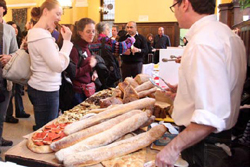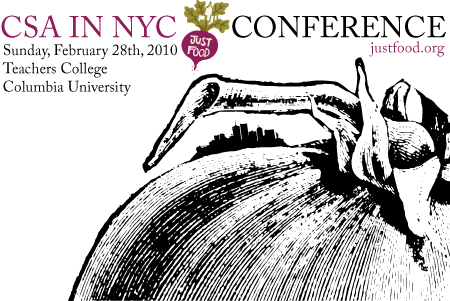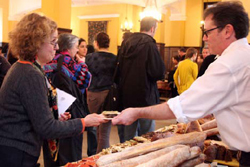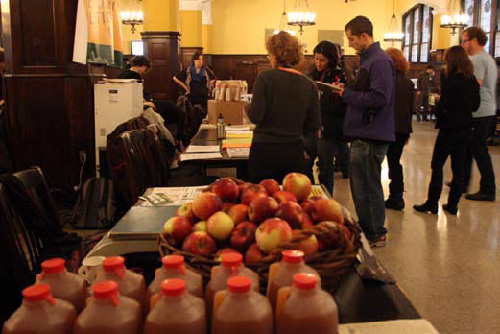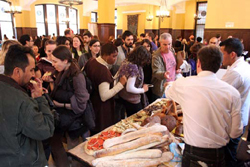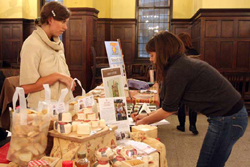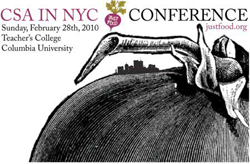A Focus on Just Food
A TC-hosted conference explores ways to right the City's nutritional disparities
In 1995, Kathy Lawrence held small meetings in the living room of her Upper West Side apartment to discuss a then widely-unrecognized topic: the disconnect between food and the environment. Among the participants was Joan Dye Gussow, TC’s Mary Swartz Rose Professor Emeritus of Nutrition and Education.
One result of those early conversations was the birth of the program Just Food, which, as its name suggests, focuses on justice around food and nutrition issues. Another was the beginning of a close and enduring partnership between Just Food and the Program in Nutrition at TC.
Fifteen years later, on a Sunday this past February, Lawrence addressed more than 400 people interested in local food at the 10th annual CSA (Community Supported Agriculture) in NYC conference, hosted by Just Food and held at TC. The last seven of these conferences have been held at the College.
Before public awareness about food and its origins began to grow, it was unclear to Lawrence, Gussow and others working with them whether their initiative would expand beyond their living room meetings. Lawrence, the first executive director of Just Food, said that creating CSA programs was a way for her group to begin “walking the talk,” and actually creating links between farmers and city residents. CSA members pay participating farmers a fee of about $500 up front to fund the farmer during growing season; farmers in turn supply CSA members with different vegetables (and fruit, dairy and meat, depending on the CSA) once a week during the harvest season. The first year there was only one CSA, with only one participating farm. There are now 100 CSAs throughout New York City , and this year’s attendance at the conference was nearly double that of 2009, necessitating a move from Milbank Chapel to the Cowin Conference Center
“Growth was very slow in the beginning,” Lawrence
“Hosting this event is a natural fit for TC,” Koch said. “The school’s nutrition program educates students about understanding the food system and how it can move towards one that supports personal and ecological health. CSAs are a strong part of that push. The TC Center for Food and Environment also provides education to schoolchildren that gives them hands-on experiences cooking, eating and learning about local foods through its EarthFriends classroom and Linking Food and the Environment [LiFE] curriculum series.”
Isobel Contento, Chair of the Program in Nutrition, added, “our partnership with Just Food allows our students to get practical experiences with issues we discuss in our classes.”
Jacquie Berger, the current executive director of Just Food, volunteered for Lawrence
Though finding enough support and funding for the growing demand for CSAs is always a challenge, Berger said, Just Food is planting seeds for food justice in new neighborhoods every year. “Through our work, we have mobilized communities to take control of their food systems.”
In addition to Lawrence
Workshops topics included how to eat “the local way;” hosting successful CSA events; and the impact of government policies and public dollars have on the farm and food system. There was also a farmer panel, which provided an opportunity to ask CSA farmers questions about what they do and why. The conference concluded with local farmers and businesses showcasing their wares—including cider, meats, cheese, beer and wine—in the TC cafeteria.
One of Just Food’s main goals at the conference was to counter the perception that work supporting local food is the province of a small “special interest” group. The conference included a number of workshops on bringing middle-income families into CSAs, and a workshop on the overview of racism in the food system was by far the most popular program of the day.
Kristyn Keener, a nutrition and public health Master’s student at Teachers College, attended the racism workshop, a topic she said can be uncomfortable. “Local food programs tend to be white in most cities, but the workshop was about ‘how do we reach out to other communities?’ and for me, that was most interesting.”
There are already a number of CSAs in low-income neighborhoods like Bedford-Stuyvesant and East New York in Brooklyn , the South Bronx Harlem. Katz said that people of all neighborhoods appreciate the food, regardless of their socio-economic background. “In all kinds of neighborhoods, the common denominator was good food—happy faces around good food. It was really a wonderful thing to see.”
As people across the income spectrum learn more about CSAs, Just Food faces new problems. “Keeping up with the demand for CSAs and finding new ways to give people the information they need in limited time is tough,” Lukats said.
Just Food is evolving from a pilot program into an organization creating wholesale systemic change. The group has already connected the dots between anti-hunger movements, nutrition, greening and community development through its various operations.
“The challenge now,” Lawrence
Meredith Kennedy and Ishita Singh, CSA conference participants, are both students at the
Published Monday, May. 10, 2010
